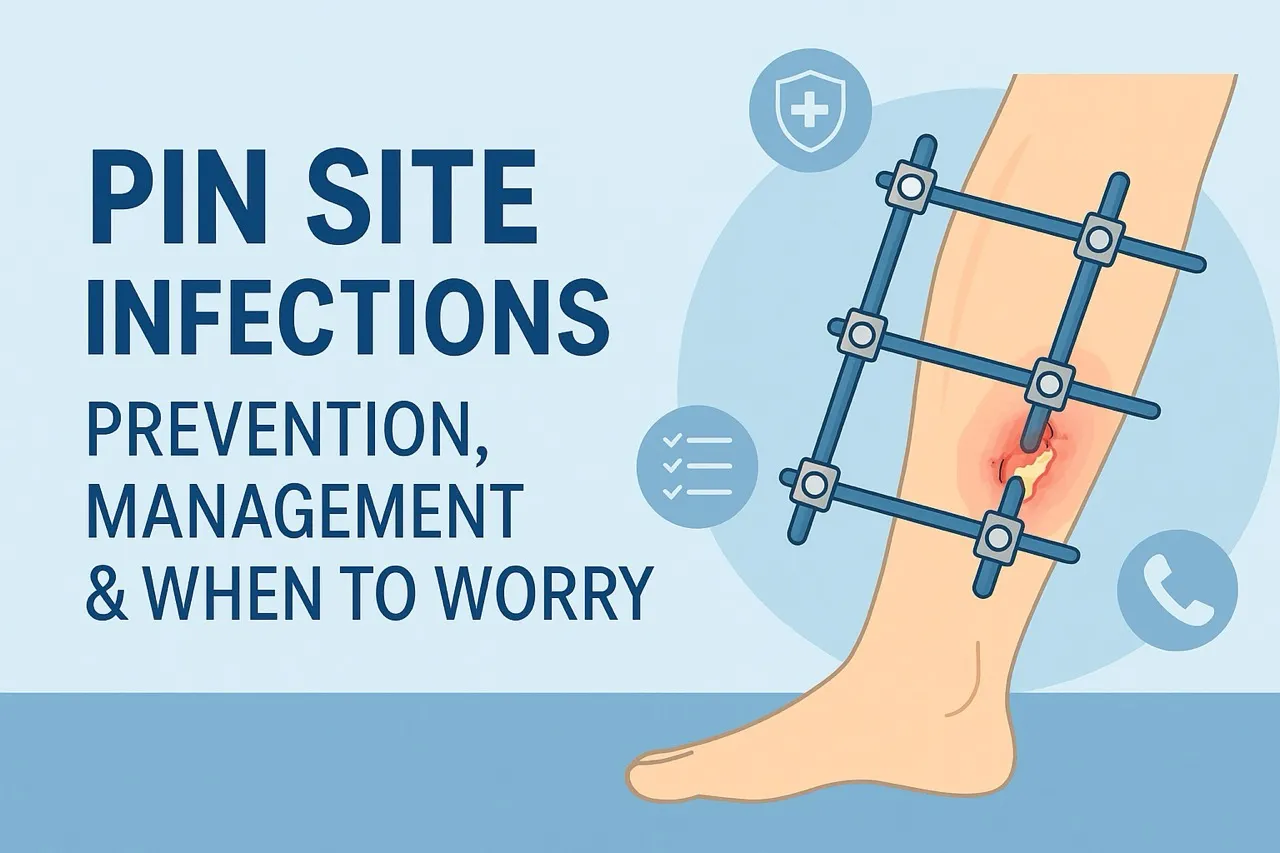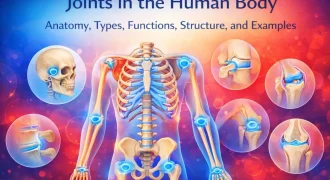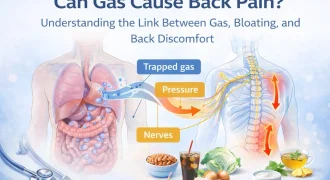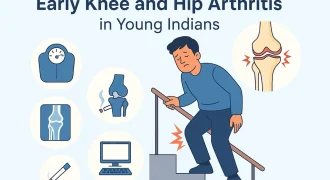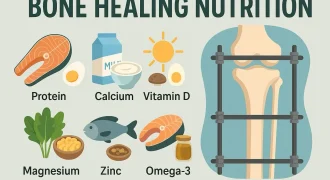Table of Contents
Pin site infections are among the most common and preventable complications seen after Ilizarov frame or external fixator surgery.
Every pin or wire that passes through the skin creates a small channel where bacteria can enter if daily care isn’t meticulous.
The good news: with proper hygiene, early recognition, and timely treatment, most pin site infections resolve quickly without affecting bone healing.
At Dr. Divya Ahuja’s centres in Mumbai and Thane, every patient is trained in a step-by-step pin-care protocol designed to ensure smooth recovery and confidence during limb reconstruction.
What Are Pin Site Infections?
A pin site is the skin–bone interface where the metal pin or wire of an external fixator emerges. Because it’s a break in the skin barrier, it can easily collect sweat, dust, or bacteria.
If bacteria multiply, inflammation and discharge occur; this is called a pin site infection.
Untreated infections can cause:
- Pain and delayed bone healing
- Loosening of the pins or frame instability
- Deep bone infection (osteomyelitis)
Surgeons often classify these infections using systems like the Checketts–Otterburn grading system, which ranges from mild surface redness to deep, bone-level infections requiring pin replacement.
Why Pin Site Care Matters
Clean, infection-free pin sites are essential for:
- Stable fixation – prevents micro-movements and loosening
- Faster bone healing – infection delays regeneration and consolidation
- Patient comfort – reduces pain and odour
- Shorter treatment duration – Neglecting hygiene, smoking, uncontrolled diabetes, and humid climates (like Mumbai’s monsoon) increase risk, making disciplined pin-care vital.
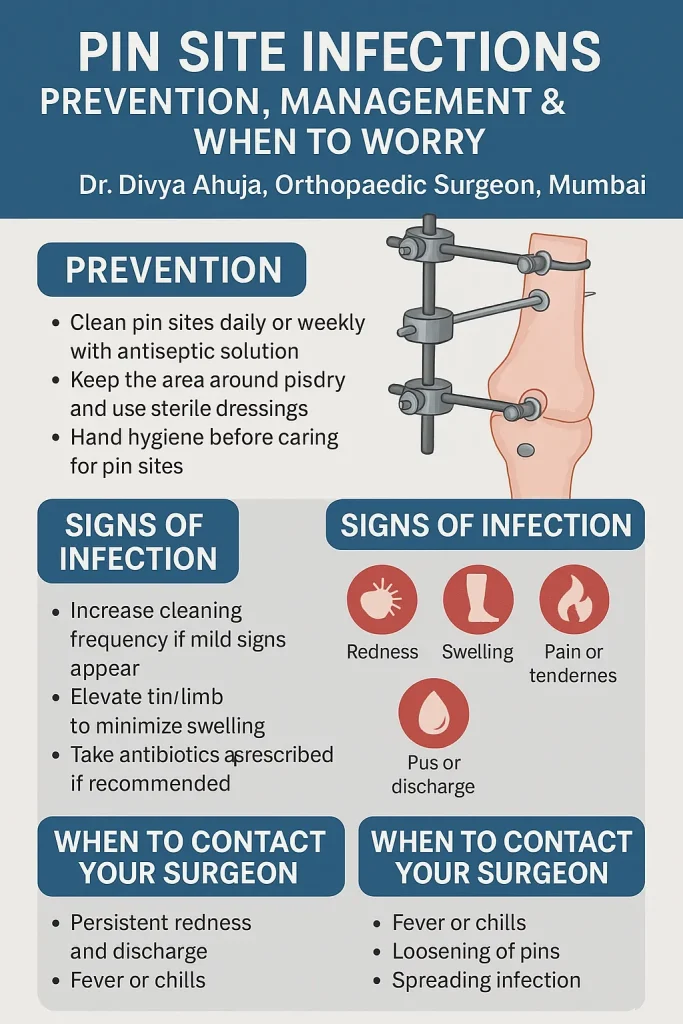
Daily Pin Site Care Protocol (Dr. Divya Ahuja’s Recommended Routine)
A. Timing
Clean pin sites once or twice daily, depending on discharge and your surgeon’s advice.
Always perform cleaning after a bath or when the area is moist for easier crust removal.
B. Materials Needed
- Sterile cotton swabs or gauze
- Antiseptic solution (normal saline or dilute povidone-iodine / chlorhexidine)
- Clean gloves or thoroughly washed hands
- Sterile dressing (if required)
C. Step-by-Step Cleaning Process
- Wash your hands with soap and water for at least 30 seconds.
- Remove any crusts or dried discharge gently using sterile gauze.
- Clean around each pin using a fresh swab soaked in antiseptic-move outward in a circular motion.
- Use one swab per pin site. Never reuse between two pins.
- Allow to air dry or pat gently with sterile gauze.
- Apply a sterile dressing only if discharge is present; otherwise, keep it open to the air.
Pro Tip: Avoid covering all pin sites unnecessarily. Ventilation helps with healing and prevents trapped moisture.
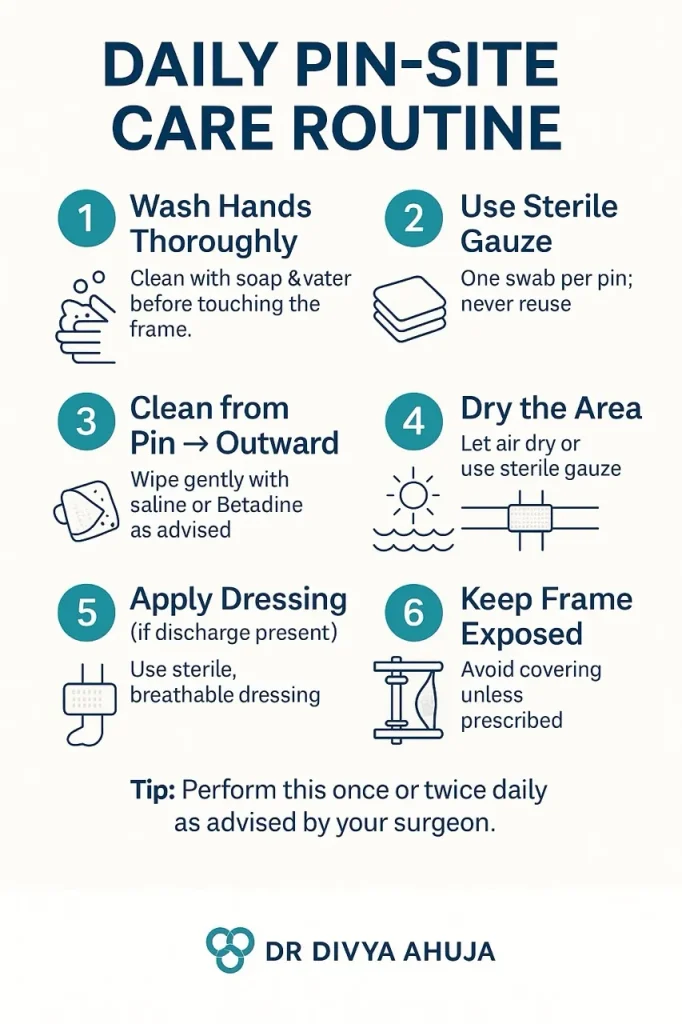
Pin Care Do’s & Don’ts
| ✅ Do | ❌ Don’t |
| Wash your hands before touching the frame | Touch pins with unwashed hands |
| Use sterile gauze/swabs | Reuse cloth or cotton balls |
| Keep the area dry | Apply talcum powder or cream |
| Follow the prescribed antiseptic | Mix home remedies |
| Attend follow-up visits | Skip reviews when pain reduces |
Early Signs of Infection – What to Watch For
| Stage | Typical Signs | What You Should Do |
| Mild | Redness, tenderness, minimal clear discharge | Increase cleaning frequency, monitor closely |
| Moderate | Pain, swelling, yellowish discharge, odour | Start prescribed oral antibiotics, visit clinic if not improving |
| Severe | Pus, fever, loose pins, spreading redness | Urgent surgical review, possible IV antibiotics |
Remember: Early detection = faster recovery.
If two consecutive days show worsening redness or pain, contact your surgeon promptly.
What to Do at Home for a Mild Infection
If you notice early symptoms:
- Clean twice daily with an antiseptic solution
- Elevate the limb to reduce swelling.
- Keep clothing loose around the frame.
- Take oral antibiotics only as prescribed (usually 7–10 days).
- Do not apply topical ointments or herbal remedies unless advised.
- Record photos of the site daily-helps your doctor monitor progress remotely.
About Antibiotics
Mild infections often respond to oral antibiotics like cephalosporins or amoxicillin-clavulanate.
Severe or recurrent infections may require culture tests and stronger medication.
Always complete the full course-even if redness subsides early.
When to Contact Your Surgeon Immediately
Seek medical help without delay if you experience:
- Persistent pain or swelling despite antibiotics
- Continuous pus or foul-smelling discharge
- Fever > 101 °F or chills
- Loose or moving pin/frame
- Blackish or necrotic skin around the pin
Mumbai & Thane Patients:
Dr. Divya Ahuja’s clinics provide same-day consultation for any pin-site emergency or wound review.
How Surgeons Manage Pin Site Infections
Depending on severity, treatment may include:
- Culture-based antibiotic selection
- In-clinic cleaning or debridement
- Pin exchange or adjustment if loosened
- IV antibiotics for deeper infection
- Wound-care therapy or dressing changes for diabetic or immunocompromised patients
Early professional intervention prevents the need for frame removal or additional surgery.
Preventing Recurrence
- Continue daily cleaning until the frame is removed.
- Maintain a balanced diet rich in protein and vitamin C for tissue healing.
- Control blood sugar in diabetic patients.
- Avoid swimming or soaking limbs.
- Attend follow-ups every 2–3 weeks for tightening and review.
Consistency is more powerful than any medication in preventing infection.
Expert Insight – Dr. Divya Ahuja
“Pin site infections are preventable in most cases. Consistent hygiene, early reporting, and nutritional support ensure safe bone healing. Never ignore minor redness-act early, and your recovery remains smooth.”
Dr. Divya Ahuja
Orthopaedic & Deformity Correction Surgeon – Mumbai | Thane
Specialist in Ilizarov, Limb Lengthening, Bone Infection & Complex Fracture Care
Know more about Dr. Ahuja →
Key Takeaways
- Daily cleaning is the single best prevention.
- Early attention to redness or discharge prevents complications.
- Regular reviews keep your frame stable and infection-free.
- Always consult your orthopaedic surgeon before starting or changing any treatment.
Our Clinical Locations
Tap a location to view timings, contact, and map.
Broadway Healthcare, Dadar East
Broadway Healthcare, Dadar East
Clinic Info
- 📍 Broadway Healthcare, Dadar East, Mumbai
- 🕒 Wednesdays · 10:00 AM – 12:00 NOON
- 📞 Appointments: +91 93213 17227
Sweet Clinics, Vashi, Navi Mumbai
Sweet Clinics, Vashi, Navi Mumbai
Clinic Info
- 📍 Sweet Clinics, Vashi, Navi Mumbai
- 🕒 Fridays · 10:00 AM – 12:00 NOON
- 📞 Appointments: +91 93213 17227
Heal Well Speciality Clinic, Thane West
Heal Well Speciality Clinic, Thane West
Clinic & OPD Info
- 📍 Heal Well Speciality Clinic, Thane West
- 🕒 Every Wednesday 10:00 AM – 11:00 AM
- 📞 Appointments: +91 81691 04438
Mangal Anand Hospital, Chembur Mumbai
Mangal Anand Hospital, Chembur Mumbai
Clinic & OPD Info
- 📍 Mangal Anand Hospital, Chembur Mumbai
- 🕒 Monday, Wednesday, Friday 03-07 PM, Thursday 06-07 PM, Free OPD Saturday 02-04 PM
- 📞 Appointments: +91 70212 18182
SRV Hospitals, Tilaknagar, Chembur
SRV Hospitals, Tilaknagar, Chembur
Clinic Info
- 📍 SRV Hospitals, Tilaknagar, Chembur
- 🕒 Monday, Wednesday, Friday 11 AM-12 PM
- 📞 Appointments: +91 84518 00800
Frequently Asked Questions
What’s the best way to clean pin sites after Ilizarov surgery?
Use sterile gauze soaked in saline or diluted antiseptic; clean outward from the pin, dry, and apply dressing only if discharge is present.
How often should I change dressings?
Usually, once a day or when wet/soiled, your surgeon may adjust frequency based on discharge.
Can I shower with an external fixator?
Yes. Use a waterproof wrap if advised, then clean and dry all pin sites immediately after bathing.
What colour discharge is normal?
Clear or slightly yellow early on can be normal; thick yellow/green pus or odour means infection.
Do all pin site infections need antibiotics?
Mild redness may respond to enhanced cleaning, but persistent pain, swelling, or pus needs prescribed antibiotics.
Can infection spread to the bone?
If untreated, yes-it can progress to osteomyelitis. Early medical attention prevents this.
What if a pin feels loose?
Do not tighten or move it yourself. Visit your surgeon immediately for safe adjustment.
I have diabetes. Am I at higher risk?
Yes. Strict sugar control and regular cleaning greatly reduce infection risk.
How long does it take for a mild infection to heal?
Usually, within 5–7 days of proper cleaning and antibiotics.
When should I contact Dr. Divya Ahuja?
If you notice worsening redness, pain, pus, or fever-call or book a same-day consultation in Mumbai or Thane.
